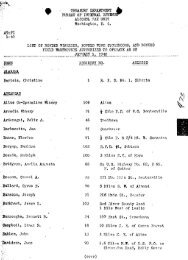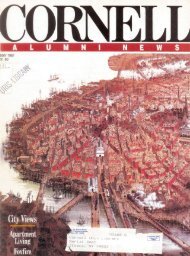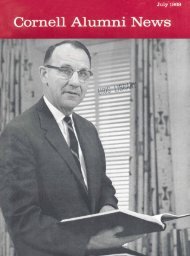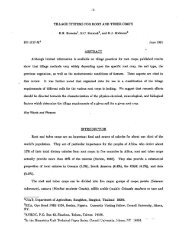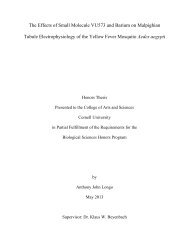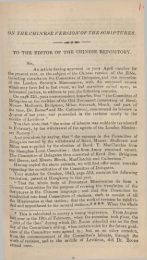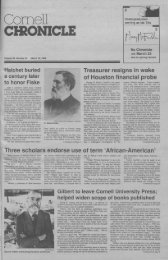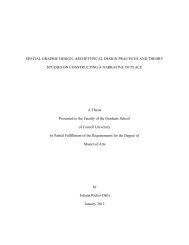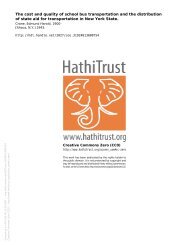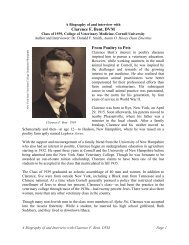Peru: you'll never see more species! - eCommons@Cornell - Cornell ...
Peru: you'll never see more species! - eCommons@Cornell - Cornell ...
Peru: you'll never see more species! - eCommons@Cornell - Cornell ...
Create successful ePaper yourself
Turn your PDF publications into a flip-book with our unique Google optimized e-Paper software.
•si.oo ^_ $1.00<br />
Hugh<br />
Troy '26<br />
LOOK FOR<br />
THIS MAN!<br />
in March Reader's Digest:<br />
Laugh With Hugh Troy<br />
World's Greatest Practical Joker<br />
$13.95 at Daltons, Waldens, or leading bookstores.<br />
Or they will order No. 0-9610986-0-0<br />
SAVES1.OO<br />
For $1.00 refund, mail your sales slip with this ad<br />
(or a copy)to<br />
CON TROY '28<br />
TROJAN BOOKS<br />
1330 Cleveland Ave., Wyomissing, PΛ 19610<br />
To order by mail send check for $14.95<br />
I$1.00 $1.00<br />
* •••••••••••••••••••••••-A-*<br />
* •<br />
ί $<br />
* I Want YOU *<br />
* To Use My Tax Refund Wisely *<br />
ί i<br />
• •<br />
* Invest in an $<br />
* •<br />
I IBM I<br />
* Personal Computer System *<br />
20-30% Discount<br />
Hardware Software<br />
•Training Sale*<br />
•Coniulting Service<br />
!<br />
• Supplies t<br />
I<br />
I<br />
! SECURE-MICRO"<br />
Division of Decision Resources, Inc.<br />
P. O. Box 9275-Cincinnati, Ohio 45209<br />
(513)474-4739<br />
••••••••••••••••••••••••••<br />
CORNELL ALUMNI NEWS<br />
president for research, was approached<br />
by Kenneth Kennard of Kodak Research<br />
Laboratories, who asked if the university<br />
would be interested in a cooperative<br />
research program. Cooke convened a<br />
group of thirty-six faculty members that<br />
created a proposal.<br />
"At that point," Cooke recalls, "Kodak<br />
began to think they'd like to do<br />
something bigger. We thought, well, to<br />
make a larger impact, why not <strong>see</strong> if we<br />
could involve some other industries."<br />
<strong>Cornell</strong> selectively approached industries<br />
that might benefit: chemical companies,<br />
Pharmaceuticals, agriculture-oriented<br />
companies.<br />
Hammes admits he was a little apprehensive<br />
at first about having industrial<br />
scientists on the advisory board that decides<br />
what projects are to be funded.<br />
"But the first meeting went extremely<br />
well," he says. "There was very little<br />
disagreement. Good research is good research,<br />
no matter whose eyes you're<br />
looking through.'' — William Steele '54<br />
Articles by Steele on pages 25 and 28<br />
explore other relationships between<br />
<strong>Cornell</strong> and industry, and the patents<br />
policy on university research.—Ed.<br />
On campus: politics,<br />
hazing & other flaps<br />
Students became involved in the 1984<br />
national election during the semester,<br />
particularly among Democrats and particularly<br />
on behalf of Colorado Senator<br />
Gary Hart's primary candidacy. Students<br />
worked for him in March in Massachusetts,<br />
where he won.<br />
A campus poll conducted in mid-<br />
March by the Willard Straight Program<br />
Board among <strong>more</strong> than 300 students<br />
showed President Reagan ahead with 35<br />
per cent of those polled, followed by<br />
Hart with 18, former Vice President<br />
Mondale 17, and the Rev. Jesse Jackson<br />
at 15. Democrats polled 56 per cent, and<br />
minor party candidates 9 per cent.<br />
Carl Sagan, the Duncan professor of<br />
astronomy and space sciences, was one<br />
of a number of scientists at Worcester,<br />
Massachusetts who endorsed Hart three<br />
days before that state's primary on "Super-Tuesday."<br />
Sagan, who has become<br />
an activist on nuclear warfare and stockpiling,<br />
said he thought Hart "has far<strong>see</strong>ing<br />
and practical approaches" in the<br />
areas of Sagan's concern.<br />
Students from various organizations<br />
on campus joined to encourage fellow<br />
students to register to vote during the<br />
presidential year, both in their home<br />
states and in Ithaca.<br />
Chi Psi became the third fraternity to<br />
be put on probation this school year,<br />
after an incident that administrators<br />
termed hazing and the brothers did not.<br />
Members followed a house tradition<br />
when they kidnapped several of their<br />
pledges and left them naked at Pi Beta<br />
Phi sorority during a party, hands tied<br />
behind their backs, and strategically<br />
covered with shaving cream.<br />
The administration charged nineteen<br />
students with violating the campus code<br />
of conduct when they blocked the doorway<br />
to a room in Barnes Hall where a<br />
US Central Intelligence Agency recruiter<br />
was interviewing students for jobs. A<br />
twentieth person, a resident of Ithaca,<br />
was arrested by city police and accused<br />
of trespassing. The CIA interviews took<br />
place.<br />
The <strong>Cornell</strong> Review, a periodical that<br />
<strong>see</strong>ks to offer a conservative point of<br />
view, published its first issue in mid-<br />
March with help from a New York City<br />
foundation, the Institute for Educational<br />
Affairs, which says it has helped<br />
found thirty-eight such college journals<br />
since 1980. William Simon, former US<br />
secretary of the treasury, was a founder.<br />
The first issue drew complaints from<br />
gays and feminists who felt derided by<br />
an article in the Review, and some concern<br />
among the <strong>Cornell</strong> College Republicans<br />
that the periodical was too "elitist"<br />
and might work against the interest of<br />
the Republican student group. Students<br />
edit and set policy for the Review, and<br />
hoped to put out four or five issues this<br />
spring.<br />
In late March the Board of Trustees<br />
approved a research program based on<br />
development of a "supercomputer," described<br />
in an article in the Alumni News<br />
in October 1983. Work will be done in a<br />
proposed Center for Theory and Simulation<br />
in Science and Engineering. Nobel<br />
laureate Kenneth G. Wilson is one of the<br />
center's founders. The trustees approved<br />
the concept of the center and left it to<br />
President Rhodes to OK a formal<br />
launching at a later time. The center<br />
would have an annual budget of $18 million<br />
by 1987, according to its prospectus,<br />
and employ a support staff of 100.<br />
Where's the space, or<br />
who pays for parking?<br />
An administration proposal to provide<br />
<strong>more</strong> parking on campus, and to pay for



